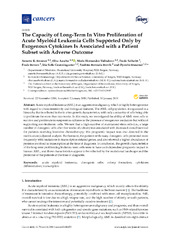The Capacity of Long-Term In Vitro Proliferation of Acute Myeloid Leukemia Cells Supported Only by Exogenous Cytokines Is Associated with a Patient Subset with Adverse Outcome
Brenner, Annette; Aasebø, Elise; Hernandez-Valladares, Maria; Selheim, Frode; Berven, Frode; Grønningsæter, Ida Sofie; Bartaula-Brevik, Sushma; Bruserud, Øystein
Peer reviewed, Journal article
Published version

Åpne
Permanent lenke
https://hdl.handle.net/1956/19808Utgivelsesdato
2019-01-10Metadata
Vis full innførselSamlinger
Originalversjon
https://doi.org/10.3390/cancers11010073Sammendrag
Acute myeloid leukemia (AML) is an aggressive malignancy, which is highly heterogeneous with regard to chemosensitivity and biological features. The AML cell population is organized in a hierarchy that is reflected in the in vitro growth characteristics, with only a minority of cells being able to proliferate for more than two weeks. In this study, we investigated the ability of AML stem cells to survive and proliferate in suspension cultures in the presence of exogenous mediators but without supporting non-leukemic cells. We saw that a high number of maintained stem cells (i.e., a large number of clonogenic cells after five weeks of culture) was associated with decreased overall survival for patients receiving intensive chemotherapy; this prognostic impact was also detected in the multivariate/adjusted analysis. Furthermore, the patients with many clonogenic cells presented more frequently with mutations in transcription-related genes, and also showed a higher abundance of proteins involved in transcription at the time of diagnosis. In conclusion, the growth characteristics of the long-term proliferating leukemic stem cells seem to have an independent prognostic impact in human AML, and these characteristics appear to be reflected by the mutational landscape and the proteome of the patients at the time of diagnosis.
